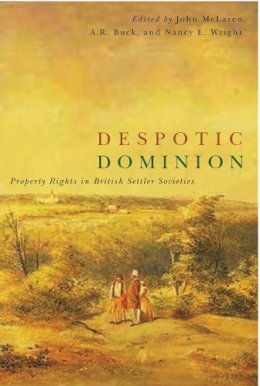
Despotic Dominion: Property Rights in British Settler Societies
John McLaren
In the late 18th century, the English jurist William Blackstone famously described property as “that sole and despotic dominion.” What Blackstone meant was that property was an “absolute right, inherent in every Englishman . . . which consists in the free use, enjoyment, and disposal of all acquisitions without any control or diminution, save only by the laws of the land.” In light of the intervening 250 years of colonization, Blackstone’s “despotic dominion” has assumed new and more ambiguous meanings. It is the ambiguity of the meanings of property and the tensions that were and still are evident in property disputes with which this book is concerned.
Despotic Dominion brings together the work of scholars whose study of the evolution of property law in the colonies recognizes the value in locating property law and rights within the broader political, economic, and intellectual contexts of those societies. The stimulus for this new interdisciplinary scholarship has emerged from litigation and political action for the resolution of questions of Aboriginal title and other disputes over property rights in several former settler colonies, most notably Australia, Canada, and New Zealand. As the essays in this book demonstrate, a significant part of the recent explosion in interest and speculation about property rights relates historically to the securing of a more reliable cultural context for assessing these claims. For this reason, Despotic Dominion will be of interest not only to students and researchers of colonial history, but also to scholars of native studies and law, as well as those interested in the contested terrain of property rights.
Product Details
About John McLaren
Reviews for Despotic Dominion: Property Rights in British Settler Societies
